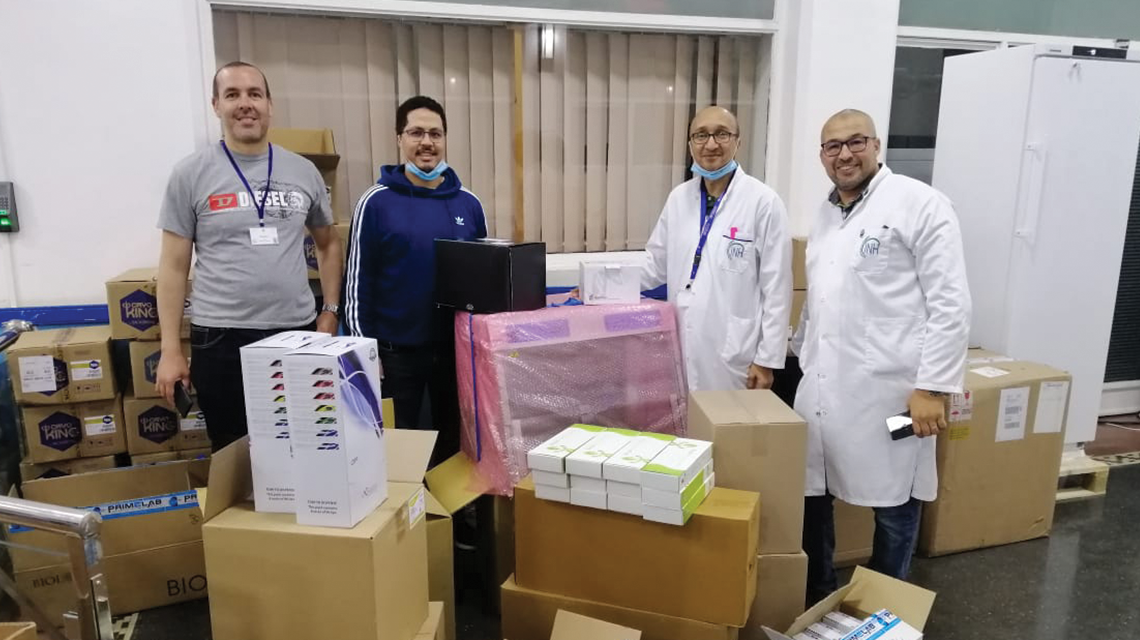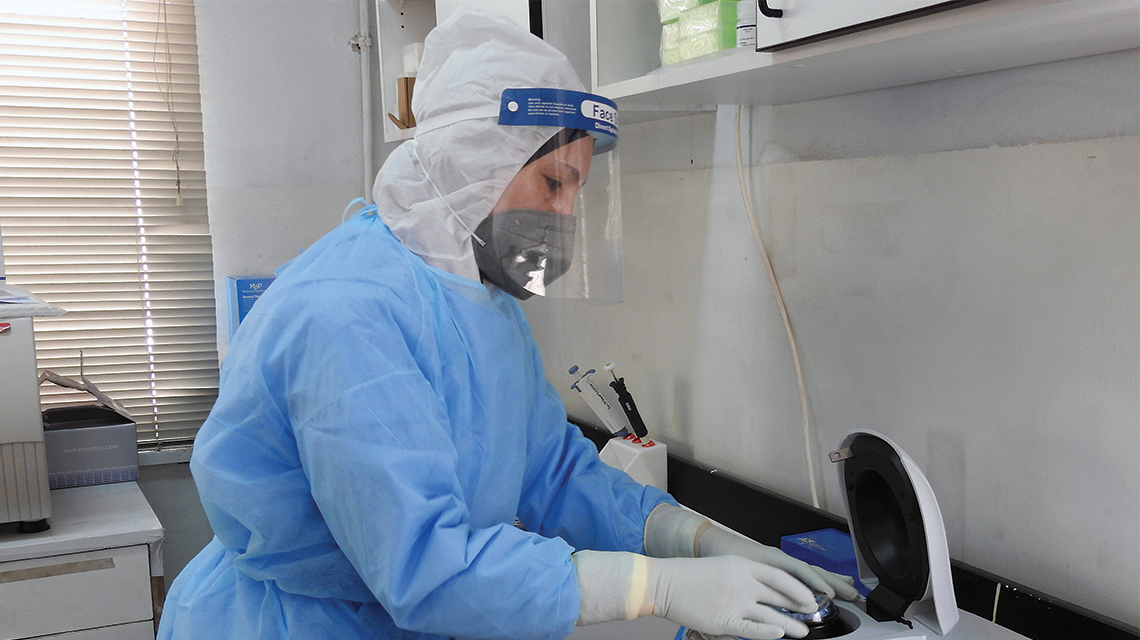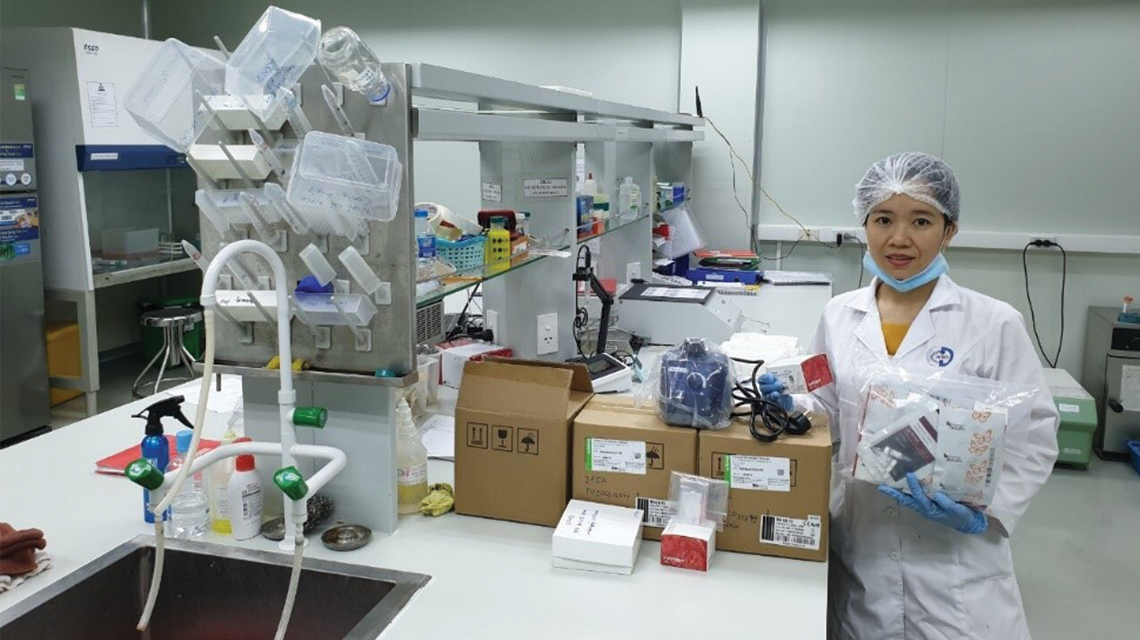IAEA Assistance for the Rapid Detection and Management of COVID-19
Background
Zoonotic diseases are animal diseases that can also infect humans. Sixty percent of human pathogens are of animal origin, while 75% of emerging animal diseases can be transmitted to humans, causing zoonotic diseases.
In recent years, the IAEA has helped countries to diagnose zoonotic diseases such as Brucella, Rift Valley fever, Ebola, Zika, dengue, Middle East respiratory syndrome coronavirus (MERS-CoV), severe acute respiratory syndrome coronavirus (SARS-Cov-1), avian influenza and others, using a nuclear-derived method called real time RT-PCR. Now, the IAEA is helping countries around the world to use this method in their fight against the COVID-19 pandemic.
Real time RT-PCR, or reverse transcription polymerase chain reaction, is a nuclear-derived method for specific detection of the presence of genetic material from humans or animals and their respective pathogens, including the RNA coronavirus SARS-CoV-2 that causes the COVID-19 disease. It is one of the most sensitive techniques available today for detecting the SARS-CoV-2 virus.
One hundred and twenty-nine countries and territories have requested IAEA assistance (44 from the Africa region, 28 from Asia and the Pacific, 24 from Europe, and 33 from the Latin America and the Caribbean region), with 305 laboratories/institutions receiving IAEA technical cooperation (TC) support. Several countries have provided €27.8 million in extrabudgetary contributions.
To date, 129 countries and territories have received related IAEA shipments, which includes 2036 RT-PCR and diagnostic kits and related items.
In addition to the provision of equipment, 11 webinars on Standard Operating Procedures (SOPs) and 24 on RT-PCR were held for health care providers. Twenty practical videos have been produced on sample collection, handling, processing, use of personal protective equipment and RT-PCR use for detection. FAQs on RT-PCR have also been made available in audio format.
The IAEA, with its expertise in nuclear science and its applications in both animal and human health, is uniquely positioned to assist Member States in building their capacity to prepare for and respond to threats and outbreaks of zoonotic diseases. Supported by its unique network of laboratories working on nuclear sciences and applications, and its technical cooperation programme, the IAEA trains technicians and scientists and provides equipment and consumables to laboratories around the world to build sustainable national capacities to use RT-PCR to detect zoonotic diseases.
The Agency, through the Department of Nuclear Sciences and Applications, in particular the Joint FAO/IAEA Division, continues to distribute updated standard operating procedures, reagent information and validation data to its Member States. More than 500 Animal Production and Health (APH) counterpart laboratories received updated SOPs, reagent information and validation data, delivered via VETLAB.

Equipment was delivered to the Hygiene Institute of the Ministry of Health, Morocco, one of the official national centres which performs coronavirus tests. (Photo: Ministry of Health, Morocco)
IAEA assistance: strategic approach
IAEA assistance is being delivered through an interregional technical cooperation project (INT0098) established as part of the 2020–2021 technical cooperation programme, designed to respond to Member State needs in the event of disease outbreaks, emergencies and disasters. Through this project, the IAEA is providing a package that includes detection equipment, namely real-time RT-PCR and kits, together with reagents and laboratory consumables, as well as biosafety supplies such as personal protection equipment and laboratory cabinets for the safe handling and analysis of samples. This equipment is essential for detecting, tracking and studying the coronavirus that causes COVID-19 disease.
IAEA assistance is strategically focused on the following elements:
1. Assistance based on countries' needs
Following receipt of a request for assistance, the IAEA assesses the needs and current situation of the requesting country, taking into consideration the daily reports provided by the World Health Organization (WHO) and the mandate of the IAEA. Equipment and other materials are delivered to designated national laboratories for COVID-19 that have been identified by the countries as requiring test kits, supplies and equipment to detect the virus and analyse and monitor epidemiological data. IAEA staff are working to ensure that this critical equipment is delivered as quickly as possible despite the ongoing challenges of limited availability of equipment and materials, border closures and transport limitations, high global demand and supply chain delays.
2. Experience and technical rigour
For more than 20 years, the IAEA, through its 12 specialized laboratories and teams of nuclear experts, has trained technicians and scientists and equipped laboratories around the world to use the real time RT–PCR method. The IAEA's response to COVID-19 focuses on technology transfer and capacity-building through the provision of specialized technical equipment, advice and expert services, and support material for setting up and using the real time RT-PCR technique. The Agency has also customized its services to the current needs and challenges, by making relevant material available on its Human Health Campus website, including educational videos on the use of real time RT-PCR, as well as training materials, webinars and protocols.
3. Effective resource mobilization
Member States as well as the private sector have shown strong support for this initiative, with several announcing major funding contributions to IAEA efforts in helping to tackle the pandemic. As a result, the IAEA has been able to meet the unprecedented number of requests from countries around the world for assistance in Africa, Asia and the Pacific, Europe, Latin America and the Caribbean.
4. Coordination with United Nations Agencies
The Agency, in partnership with the Food and Agriculture Organization of the United Nations (FAO), works in close cooperation with the WHO and the World Organization for Animal Health, and is a member of the WHO-led UN Crisis Management Team for COVID-19. The IAEA is taking concrete and coordinated action to support global efforts against the pandemic.

Staff are now using new equipment delivered to the Central Laboratories at the Ministry of Health, Jordan. (Photo: Central Laboratories/Ministry of Health, Jordan)
5. Sustainability and long-term commitment
The RT-PCR equipment provided by the IAEA is indispensable in laboratories for a wide range of applications and strengthens national capacities for the detection of various types of viruses. Real-time RT-PCR is currently the most widely used method for detecting coronaviruses, but many countries still need support in setting up and using the technique. The IAEA and its laboratories have a long-standing history in assisting Member States in a range of subject areas, as well as through applied research and development, training and technical and analytical services. IAEA scientists provide expertise, standard operating procedures and expert services to technicians and scientists around the world so that national skills and capabilities are sustainable on their own. The Agency's laboratories support the technical activities of Member States, and national laboratories can continue to benefit from IAEA support and expertise when needed or when any other unexpected need arises.
6. IAEA readiness to help Member States in outbreaks
The IAEA, through its technical cooperation programme, has proven to be a very effective mechanism to provide assistance worldwide and has enabled the IAEA to be flexible and rapid in responding to the needs of Member States, as well as to unforeseen emergency events such as COVID-19. The IAEA is the global centre for cooperation in the nuclear field and seeks to promote the safe, secure and peaceful use of nuclear technology, such as that used to address this pandemic.

The National Centre for Veterinary Diagnostics in Viet Nam has also received equipment from the IAEA. (Photo: Ngo Van Bac/NCVD)


